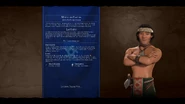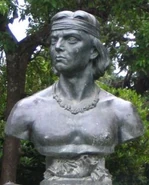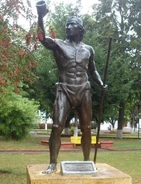- "Band together or die apart."
Leftraru (c. 1534 – 29 April 1557), better known as Lautaro, was a young Mapuche toqui, known for escaping captivity under Spanish governor Pedro de Valdivia and afterwards turning his captors' tactics against them while leading the resistance against the Spanish conquest of Chile. He leads the Mapuche in Civilization VI: Rise and Fall.
The Mapuche maintain a strong Loyalty within their people, and can be a formidable foe on the battlefield, both offensively and defensively.
Intro[]
You did not liberate the Mapuche, young Lautaro—you inspired them to free themselves. Build totems to honor your ancestors and embolden their descendants. Such pride will fill the hearts of your cavalry as they redouble their raids into enemy lands. Stand with the Mapuche, axe-bearer, and cast a singular shadow.
In-Game[]
Lautaro's unique agenda is Spirit of Tucapel. He tries to keep his cities' Loyalty high, dislikes civilizations that lose cities due to low Loyalty and likes civilizations that earn cities through Loyalty pressure.
His leader ability is Swift Hawk. Mapuche units gain +10 ![]() Combat Strength when fighting civilizations in Golden or Heroic Ages, as well as when fighting Free Cities. Defeating a unit within the borders of an enemy city causes that city to lose 20 Loyalty, or 40 Loyalty if that city belongs to a civilization in a Golden or Heroic Age.
Combat Strength when fighting civilizations in Golden or Heroic Ages, as well as when fighting Free Cities. Defeating a unit within the borders of an enemy city causes that city to lose 20 Loyalty, or 40 Loyalty if that city belongs to a civilization in a Golden or Heroic Age.
Detailed Approach[]
The Mapuche will want to acquire a Governor early, using them both to strengthen Loyalty in their cities as well as granting their combat units the ability to gain experience faster on the battlefield. When at war, the Mapuche need not fear an opponent benefitting from a Golden Age. When going on the offense, fight within your opponent's borders to weaken the Loyalty in their cities. Use this to your advantage to create unrest to slow their production or cause them to lose cities that are already disloyal. The Mapuche Malón Raider is a powerful assault unit, but don't neglect training them even with a defensive strategy, as they are excellent at defending their borders from attack. A late game Culture victory is also a possibility for the Mapuche with strategic placement of their Chemamull improvement.
Lines[]
Lautaro is voiced by Anthony Nahuelhual. He speaks Mapudungun.
Voiced[]
| Codename | Quote (English translation) | Quote (Mapudungun) | Notes |
|---|---|---|---|
| Agenda-based Approval | Your people take great pride in where they come from. It is clear they follow your lead. | Tami pu che poyeniefi ñi tuwün. Kimfali tañi inaken tami newen engün. | |
| Agenda-based Disapproval | How do you lead such a boring people? Do they follow the example you set? | Chumngechi ngünewküleymi ayikekunuchi pu che mew. Inawentukeyngün kay tami femkey? | |
| Attacked | I knew you could not be trusted! We have long prepared for this war. Have you? | Kimniefun eymi mew tañi maneluwnuam. Fentrentu pepikewaiñ tüfachi weychan mew. Eymi kay? | |
| Declares War | It comes to war. Mapuche shall use your own weapons against you! | ? | |
| Defeated | We resisted to the last, but it was too late … too late. | Afkentu newentufiyiñ, welu zewmangelafuy chem chumal… zewmangelafuy chem chumal. | |
| Greeting | I am Lautaro, the Swift Hawk. Mapuche honor me with respect. Will I see the same from you? | Leftraru iñche, chi lef traru, pu mapuche feyentunienew. Eymi ka femaymi? | |
| Quote from Civilopedia | Band together or die apart. | ? |
Unvoiced[]
Delegation: Mapuche send gifts. The cloth is our finest work. The charquicán is delicious. Please accept these.
Accepts Delegation from Player: I thank you for your delegation. Mapuche welcome them as honored visitors.
Rejects Delegation from Player: Your delegation may not enter Mapuche cities.
Accepts Player's Declaration of Friendship: The world will know we lead two peoples with one will.
Rejects Player's Declaration of Friendship: Mapuche are not prepared for this friendship. Perhaps in time we will be.
Requests Declaration of Friendship: One will, two people. Should we tell the world we stand as friends?
Player Accepts Declaration of Friendship: Yes, good.
Trade Deal Accepted: You honor Mapuche with this.
Trade Deal Rejected: You offend me.
Denounced by Player: Your deeds reflect your true nature. The Mapuche cannot stand you!
Denounces Player: Mapuche use your name as a curse. Who can stand with you? Your friends turn their backs to you.
Invitation to Capital: I will tell you of the capital of Mapuche, if you will tell me of your capital.
Invitation to City: You approach Mapuche land. Do you seek to walk among our chemamull, and learn of our ancestors?
Civilopedia entry[]
Revered among the people of Chile as the Toqui (war chief or axe-bearer) who defied infamous Spanish Conquistador Pedro de Valdivia, Lautaro was still a teenager when he first led the united Mapuche tribes into battle against their colonial tormentors. Having been held captive by the Spanish and forced to serve Valdivia as his stable boy for nearly three years prior, Lautaro's jailers had unknowingly given him a prime opportunity to learn the weaknesses of the Conquistadors—weaknesses Lautaro would exploit soon after escaping their grasp.
Long before his first encounters with the Spanish (who had trouble pronouncing the native language) Lautaro was actually known as Leftraru, or "Swift Hawk" in the Mapuche language. And as the son of a peacetime Mapuche chief, by all accounts he lived a relatively quiet early life. It wasn't until his capture (sometime between the ages of 15 and 17) that Lautaro's story truly unfolds, intertwined with that of the local governor, Pedro de Valdivia.
While leading Spain's colonization efforts in Chile, Valdivia spent years establishing a foothold for his nation at the expense of the indigenous tribes. For Lautaro and the Mapuche, this meant the arrival of Spanish settlements and forts throughout their territory in southern Chile. It was during his defense of these settlements from the local populace that Valdivia first captured Lautaro, an event retold through limited historical records and local legends in Chile.
By some accounts, Lautaro knowingly allowed himself to be captured in an effort to infiltrate the Spanish and learn their ways. Whether or not that was the case, what can be said with certainty is that Lautaro was forced into servitude, and it was during his time with Valdivia that "Leftraru" first became "Felipe Lautaro" due to the aforementioned pronunciation issues of the Spanish.
We also know that at some point Lautaro became a groom, tasked with tending to the Conquistadors' horses. By observing how the Conquistadors handled their mounts and how they maneuvered in battle, Lautaro came to understand the limitations of the imposing Spanish cavalry.
If the more colorful tales are to be believed, Lautaro bided his time among the Spanish until he had learned all there was to know about the Conquistadors, planning his escape only when he was sure he could truly lead his people in a successful rebellion.
When he finally did return to the Mapuche, a council of war declared that Lautaro would serve as vice-Toqui to a powerful warrior known as Caupolican. Together, they led an assault on the Spanish forts now scattered across their territory.
Catching the Spanish forces off-guard, Lautaro and the Mapuche were initially met with great success. On what may have been his first outing as a war chief, Lautaro led 6,000 Mapuche warriors to victory at the Battle of Tucapel in 1553 by seizing the Spanish fort. When Pedro de Valdivia attempted to retake the settlement a short time later, his entire army was slaughtered, and he was unceremoniously captured and killed by the Mapuche under the leadership of his former slave.
Unfortunately for Lautaro's campaign, Mapuche tradition dictated that following each victory in battle, a lengthy period of celebration was required. These celebrations were enough to delay Lautaro's progress and allowed the Spanish to abandon some of their settlements before the Mapuche arrived.
After several decisive victories, Lautaro eventually set his sights on the Spanish capital of Santiago. Although his forces were dwindling due to illness, supply constraints, and lack of reinforcements, Lautaro pressed on. After a number of initial skirmishes, Lautaro's forces established an encampment outside the city in preparation for a larger attack.
As the story goes, Lautaro and his army were betrayed by the locals who spotted his camp and betrayed its position to Francisco de Villagra, the governor who replaced Pedro de Valdivia. With this information in hand, Villagra ambushed Lautaro on the morning on April 29th 1557, killing him and leaving the native army in shambles.
Today, Lautaro is among the most famous military leaders in Chilean history, considered by many to be the nation's first true General in light of his tactics on the battlefield. The overwhelming forces of the Spanish did little to slow Lautaro's determination, and his efforts to stop the Spanish atrocities against his people spurred a period of resistance that lasted for nearly three centuries after his passing.
Trivia[]
- Lautaro's leader ability is a direct translation of his name in Mapudungun, while his leader agenda references his role as a commander in the Battle of Tucapel.
- Lautaro's diplomacy screen depicts the Salto del Laja in Chile, a sacred site for the Mapuche.
- Lautaro is sometimes seen carrying a rapier on his diplomacy screen. When denouncing a player, he carries a stone tomahawk instead.
- By being portrayed as a teenager, Lautaro is the youngest leader at the time of their depiction in Civilization VI and its expansions.
Gallery[]
Videos[]
Related achievements[]

|
Deeds of a Monarch-Scorning People
Win a regular game as Lautaro
|

|
Reverse Colonialism
As Lautaro, capture Philip II's original capital city.
|
See also[]
- Lautaro in other games






